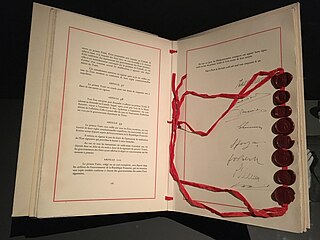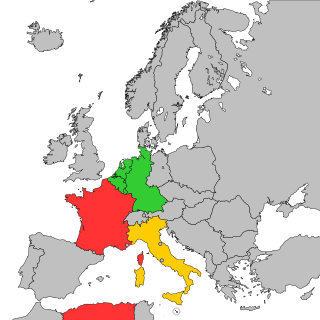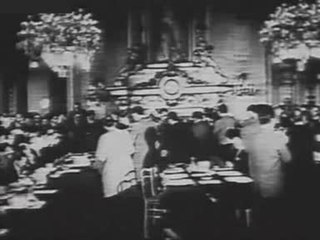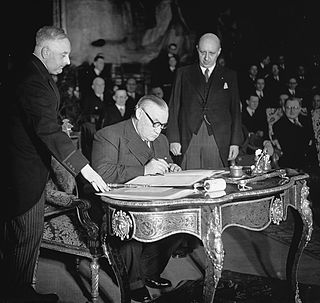
The European Coal and Steel Community (ECSC) was a European organization created after World War II to integrate Europe's coal and steel industries into a single common market based on the principle of supranationalism which would be governed by the creation of a High Authority which would be made up of appointed representatives from the member states who would not represent their national interest, but would take and make decisions in the general interests of the Community as a whole. It was formally established in 1951 by the Treaty of Paris, signed by Belgium, France, Italy, Luxembourg, the Netherlands, and West Germany and was generally seen as the first step in the process of European integration following the end of the Second World War in Europe. The organization's subsequent enlargement of both members and duties ultimately led to the creation of the European Union.

The European Economic Community (EEC) was a regional organisation created by the Treaty of Rome of 1957, aiming to foster economic integration among its member states. It was subsequently renamed the European Community (EC) upon becoming integrated into the first pillar of the newly formed European Union in 1993. In the popular language, however, the singular European Community was sometimes inaccurately used in the wider sense of the plural European Communities, in spite of the latter designation covering all the three constituent entities of the first pillar.

The European Union is a geo-political entity, created in 1993, covering a large portion of the European continent. It is founded upon numerous treaties and has undergone expansions and secessions that have taken it from six member states to 27, a majority of the states in Europe.

The Treaty of Rome, or EEC Treaty, brought about the creation of the European Economic Community (EEC), the best known of the European Communities (EC). The treaty was signed on 25 March 1957 by Belgium, France, Italy, Luxembourg, the Netherlands and West Germany, and it came into force on 1 January 1958. Originally the "Treaty establishing the European Economic Community", and now continuing under the name "Treaty on the Functioning of the European Union", it remains one of the two most important treaties in what is now the European Union (EU).

The Treaty of Paris was signed on 18 April 1951 between France, Italy, West Germany, Belgium, Luxembourg, and the Netherlands, establishing the European Coal and Steel Community (ECSC), which subsequently became part of the European Union. The treaty came into force on 23 July 1952 and expired on 23 July 2002, exactly fifty years after it came into effect.

The Treaty establishing the European Defence Community, also known as the Treaty of Paris, is an unratified treaty signed on 27 May 1952 by the six 'inner' countries of European integration: the Benelux countries, France, Italy, and West Germany. The treaty would have created a European Defence Community (EDC), with a unified defence force acting as an autonomous European pillar within the North Atlantic Treaty Organization (NATO). The ratification process was completed in the Benelux countries and West Germany, but stranded after the treaty was rejected in the French National Assembly. Instead, the London and Paris Conferences provided for West Germany's accession to NATO and the Western European Union (WEU), the latter of which was a transformed version of the pre-existing Western Union. The historian Odd Arne Westad calls the plan "far too complex to work in practice".

Jean-Baptiste Nicolas Robert Schuman was a Luxembourg-born French statesman. Schuman was a Christian democratic political thinker and activist. Twice Prime Minister of France, a reformist Minister of Finance and a Foreign Minister, he was instrumental in building postwar European and trans-Atlantic institutions and was one of the founders of the European Communities, the Council of Europe and NATO. The 1964–1965 academic year at the College of Europe was named in his honour. In 2021, Schuman was declared venerable by Pope Francis in recognition of his acting on Christian principles.

The European Communities (EC) were three international organizations that were governed by the same set of institutions. These were the European Coal and Steel Community (ECSC), the European Atomic Energy Community, and the European Economic Community (EEC), the last of which was renamed the European Community (EC) in 1993 by the Maastricht Treaty establishing the European Union. The European Union was established at that time more as a concept rather than an entity, while the Communities remained the actual subjects of international law impersonating the rather abstract Union, becoming at the same time its first pillar. In the popular language, however, the singular European Community was sometimes inaccurately used interchangeably with the plural phrase, in the sense of referring to all three entities.
A supranational union is a type of international organization and political union that is empowered to directly exercise some of the powers and functions otherwise reserved to states. A supranational organization involves a greater transfer of or limitation of state sovereignty than other kinds of international organizations.

The Schuman Declaration, or Schuman Plan, was a proposal to place French and West German production of coal and steel under a single authority that later became the European Coal and Steel Community, made by the French foreign minister, Robert Schuman, on 9 May 1950, the day after the fifth anniversary of the end of World War II in Europe. The alliance would later be opened to other European countries. The ultimate goal was to pacify relations, especially between France and West Germany, through gradual political integration to be achieved by creating common interests. Schuman said that "[t]he coming together of the countries of Europe requires the elimination of the age-old opposition of France and Germany ... the solidarity in production thus established will make it plain that any war between France and Germany becomes not merely unthinkable, but materially impossible."

The Treaty of Brussels, also referred to as the Brussels Pact, was the founding treaty of the Western Union (WU) between 1948 and 1954, when it was amended as the Modified Brussels Treaty (MTB) and served as the founding treaty of the Western European Union (WEU) until its termination in 2010. The treaty provided for the organisation of military, economic, social and cultural cooperation among member states as well as a mutual defence clause.

The year 1948 marked the beginning of the institutionalised modern European integration. With the start of the Cold War, the Treaty of Brussels was signed in 1948 establishing the Western Union (WU) as the first organisation. In the same year, the International Authority for the Ruhr and the Organization for European Economic Co-operation, the predecessor of the OECD, were also founded, followed in 1949 by the Council of Europe, and in 1951 by the European Coal and Steel Community, with the ensuing moves to create further communities leading to the Treaty of Rome (1957).

The history of the European Communities between 1958 and 1972 saw the early development of the European Communities. The European Coal and Steel Community (ECSC) had just been joined by the European Atomic Energy Community (Euratom) and the European Economic Community (EEC), the latter of which soon became the most important. In 1967 the EEC's institutions took over the other two with the EEC's Commission holding its first terms under Hallstein and Rey.

This is a timeline of European Union history and its previous development.

The London and Paris Conferences were two related conferences held in London and Paris during September–October 1954 to determine the status of West Germany. The talks concluded with the signing of the Paris Agreements, which granted West Germany some sovereignty, ended the occupation, and allowed its admittance to NATO. Furthermore, both West Germany and Italy joined the Brussels Treaty on 23 October 1954. The Agreements went into force on 5 May 1955. The participating powers included France, the United Kingdom, Belgium, the Netherlands, Luxembourg, West Germany, Italy, Canada, the United States, and remaining NATO members.

The International Authority for the Ruhr (IAR) was an international body established in 1949 by the Western Allies to regulate the coal and steel industries of the Ruhr area in West Germany. Its seat was in Düsseldorf.

The High Authority was the executive branch of the former European Coal and Steel Community (ECSC). It was created in 1951 and disbanded in 1967 when it was merged into the European Commission.

The Inner Six, also known as the Six, the Six founders, or the founding members of the European Union, refers to Belgium, France, Germany, Italy, Luxembourg, and Netherlands, the six founding member states of the European Communities, now succeeded by the European Union. Named for their location on a map of western Europe, the Inner Six contrasted with the "Outer Seven", which pursued a free-trade system.
The Treaty of Dunkirk was signed on 4 March 1947, between France and the United Kingdom in Dunkirk (France) as a Treaty of Alliance and Mutual Assistance against a possible German attack in the aftermath of World War II. It entered into force on 8 September 1947 and according with article VI paragraph 2 of its text it remained in force for a period of fifty years.
The Dupong-Schaus Ministry was the government of Luxembourg between 1 March 1947 and 3 July 1951. It was a coalition between the Christian Social People's Party (CSV), and the Democratic Group.















